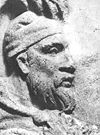- Cauci
-
- This article is about the early Irish population group. For the continental Germanic group, see Chauci.
The Cauci (Καῦκοι) were a people of early Ireland, uniquely documented in Ptolemy's 2nd-century Geography, which locates them roughly in the region of modern County Dublin and County Wicklow.[1] From the early 19th century, comparative linguists, notably Lorenz Diefenbach, identified the Cauci with the Germanic Chauci of the Low Countries and north-western Germany, a parallel already drawn by earlier antiquarian scholarship.[2] Proponents of this view also pointed to the fact that the Manapii (Μανάπιοι), who in Ptolemy's map border the Cauci to the south, likewise bear a name that is almost identical to that of another continental tribe, the Belgic Menapii in north-eastern Gaul. This correspondence appeared to testify to population movements between the two regions. The linguistic aspect of this hypothesis was most recently (1917) developed by Julius Pokorny,[3] although the Cauci-Chauci association is not universally accepted.[4] This early scholarship also drew attention to apparent parallels among Celtic or Celticized peoples of the Iberian peninsula, specifically a leader of the Lusitani named Kaukainos (Καυκαῖνος), and a city called Kauka (Καύκα) (modern Coca), inhabited by Kaukaioi (Καυκαῖοι), among the Vaccaei, a prominent Celtiberian people.[5] With regard to possible descendants of the Irish Cauci, Pokorny and Ó Briain[6] respectively favoured the obscure medieval septs of Uí Cuaich and Cuachraige, though in neither case has a connection been demonstrated.
References
- ^ Ptol. Geog. 2.2.8 (ed. K. Müller [Paris 1883-1901]); P. Freeman, Ireland and the Classical World (Austin, Texas, 2001), pp. 69, 78-80
- ^ L. Diefenbach, Celtica. Sprachliche Documente zur Geschichte der Kelten (Stuttgart 1839-40) I, pp. 414-15
- ^ Julius Pokorny, "Spuren von Germanen im alten Irland vor der Wikingerzeit", Zeitschrift für celtische Philologie 11, 1917, 169-188 at 171
- ^ T. F. O'Rahilly, Early Irish History and Mythology, Dublin Institute for Advanced Studies, 1946, pp. 24-25
- ^ Appian, Iberica 51-2, 57; Zosimus, Historia Nova 4.24.4; L. Diefenbach, Celtica. Sprachliche Documente zur Geschichte der Kelten (Stuttgart 1839-40) I, pp. 320-21
- ^ Micháel Ó Briain, "Studien zu irischen Völkernamen 1. Die Stammesnamen auf -rige", Zeitschrift für celtische Philologie 15, 1925, pp. 222-237
Towns Dunon • Eblana • Iuernis • Labiros • Makolikon • Manapia • Nagnata • Raiba • Regia • Regia EteraRivers Argita • Auoba • Birgos • Buuinda • Dabrona • Dur • Iernos • Libnios • Logia • Modonnos • Oboka •Rauios •Senos • Uidua • UinderiosPromontories Isamnion • Northern • Robogdion • Sacron • Southern • UennicnionIslands Adros • Ebuda • Epidion • Erimnos • Limnos • Malaios • Mona • Monaoida • RikinaDacia topics Dacian tribes: Aedi · Albocense · Anartes · Apuli · Artakioi · Biephi · Biessoi · Buri · Carpi · Cauci · Ciaginsi · Clariae · Costoboci · Cotini · Crobidae · Daci · Getae · Moesi · Osi · Peukini · Piephigi · Potulatense · Predasense · Rhadacense · Saldense · Scaugdae · Sense · Suci · Terizi · Teurisci · Trixae · Tyragetae · Troglodytae
Dacian kings: Culture and civilisation: Art, jewellery, treasures, tools (Bracelets) · Clothing · Foreign Relations (Greeks · Celts · Romans · Germanic tribes) · Warfare (Falx · Sica · Thracian warfare)
Sarmizegetusa · Argidava · Buridava · Cumidava · Piroboridava · Sucidava · More towns... · Davae · Dacian Fortresses of the Orăştie Mountains · Murus dacicusWars with the
Roman Empire:Roman Dacia: Dacia Traiana · Moesia · Scythia Minor · Dacia Aureliana · Diocese of Dacia · Dacia Mediterranea · Dacia Ripensis · Trajan (Bridge · Column) · Towns and cities · Castra · Limes (Alutanus · Moesiae · Porolissensis · Sarmatiae · Transalutanus · Trajan's Wall · Brazda lui Novac) · Language (Thraco-Roman · Eastern Romance substratum)Research on Dacia: Books about Dacia · Dacian archaeology · Archaeological sites in Romania · Dacology · Thracology · ProtochronismWikiProject • Commons • Dacian fortresses, settlements, Roman castra, limes from Romania: Google Maps • Google EarthCategories:- Ancient Ireland
- Medieval Ireland
- Kingdoms of ancient Ireland
Wikimedia Foundation. 2010.
